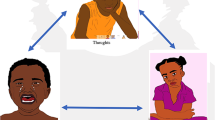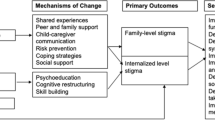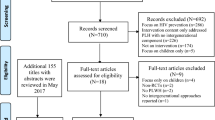Abstract
This study examined the preliminary impact of group-cognitive behavioral therapy (G-CBT) and a family-strengthening intervention delivered via multiple family groups (MFG-FS) on HIV stigma, parenting stress, and the mental health of caregivers of adolescents living with HIV. We analyzed data from the Suubi4Stigma study (2020–2022), a two-year pilot randomized clinical trial for adolescents and their caregivers (N = 89 dyads), recruited from nine health clinics in Uganda. Adolescent-caregiver dyads were randomized to three intervention conditions delivered over three months, with data collected at baseline, three and six-months follow-up. We fitted mixed-effects linear regression models to test the effect of the interventions on caregiver outcomes over time. At six months, caregivers randomized to the MFG-FS condition reported lower levels of stigma by association (mean difference = -1.45, 95% CI = -2.52 – -0.38, p = 0.008), and stigma and discrimination attitudes (mean difference = -3.84, 95% CI = -4.63 – -3.05, p < 0.001), compared to Usual care condition. In addition, caregivers of adolescents randomized to the G-CBT condition reported lower levels of stigma and discrimination attitudes at three months (mean difference = -5.18, 95% CI = -9.13 – -1.22, p = 0.010), and at six months (mean difference = -6.70, 95% CI = -9.28 – -4.12, p < 0.001). Caregiver mental health and parenting stress significantly reduced over time regardless of intervention condition. Findings point to the importance of incorporating stigma reduction components within psychosocial interventions targeting adolescents and families impacted by HIV.

Similar content being viewed by others
References
Kalomo EN, Liao M. Burden of care among Caregivers of Persons Living with HIV/AIDS in Rural Namibia: correlates and outcomes. Soc Work Public Health. 2018;33(1):70–84. https://doi.org/10.1080/19371918.2017.1415180.
Mujjuzi I, Mutegeki P, Nabuwufu S, Wosukira A, Namata F, Alayo P, Amanya SB, Nyeko R. Care Burden and Coping Strategies among Caregivers of Paediatric HIV/AIDS in Northern Uganda: A Cross-Sectional Mixed-Method Study. AIDS Res Treat. 2021; 2021:6660337. https://doi.org/10.1155/2021/6660337.
Atanuriba GA, Apiribu F, Boamah Mensah AB, et al. Caregivers’ experiences with Caring for a child living with HIV/AIDS: a qualitative study in Northern Ghana. Glob Pediatr Health. 2021;8:2333794X211003622.
Mafune RV, Lebese RT, Nemathaga LH. Challenges faced by caregivers of children on antiretroviral therapy at Mutale Municipality selected healthcare facilities, Vhembe District, Limpopo Province. Curationis. 2017;40(1):e1–9. https://doi.org/10.4102/curationis.v40i1.1541.
Poudel AN, Newlands D, Simkhada P. The economic burden of HIV/AIDS on individuals and households in Nepal: a quantitative study. BMC Health Serv Res. 2017;17(1):76. https://doi.org/10.1186/s12913-017-1976-y.
UNAIDS. UNAIDS Data. 2022. https://www.unaids.org/en/resources/documents/2023/2022_unaids_data.
Uganda AIDS. Commission. Facts on HIV and AIDS in Uganda 2022. https://uac.go.ug/index.php?option=com_sppagebuilder&view=page&id=24&Itemid=140.
Data UNAIDSUNAIDS. 2018. http://www.unaids.org/sites/default/files/media_asset/unaids-data-2018_en.pdf.
The National Forum of People Living with HIV/AIDS Networks in Uganda (NAFOPHANU). The People living with HIV Stigma Index. Uganda Country Assessment 2019. https://www.stigmaindex.org/country-reports/#/m/UG.
Bogart LM, Cowgill BO, Kennedy D, et al. HIV-related stigma among people with HIV and their families: a qualitative analysis. AIDS Behav. 2008;12(2):244–54. https://doi.org/10.1007/s10461-007-9231.
Nabunya P, Namuwonge F, Sensoy Bahar O, Ssentumbwe V, Migadde H, Mugisha J, Ssewamala FM. Stigma by Association, Parenting Stress, and the Mental Health of Caregivers of Adolescents Living with HIV in Uganda. J Adolesc Health. 2023;72(5S):S18–23. https://doi.org/10.1016/j.jadohealth.2022.08.017.
Kasande M, Natwijuka A, Katushabe Snr E, Tweheyo Otwine Snr A. Experiences of caring for adolescents living with HIV (ALHIV): a qualitative interview with caregivers. HIV AIDS (Auckl). 2022; 14:577–89. https://doi.org/10.2147/HIV.S388715.
Campbell L, Masquillier C, Thunnissen E, Ariyo E, Tabana H, Sematlane N, Delport A, Dube LT, Knight L, Flechner TK, Wouters E. Social and Structural determinants of Household Support for ART Adherence in Low- and Middle-Income countries: a systematic review. Int J Environ Res Public Health. 2020;17(11):3808. https://doi.org/10.3390/ijerph17113808.
Damulira C, Mukasa MN, Byansi W, Nabunya P, Kivumbi A, Namatovu P, Namuwonge F, Dvalishvili D, Bahar OS, Ssewamala FM. Examining the relationship of social support and family cohesion on ART adherence among HIV-positive adolescents in southern Uganda: baseline findings. Vulnerable Child Youth Stud. 2019;14(2):181–90. https://doi.org/10.1080/17450128.2019.1576960.
Nabunya P, Kizito S, Ssewamala FM. The effect of family support on self-reported adherence to ART among adolescents perinatally infected with HIV in Uganda: a mediation analysis. J Adolesc. 2023;95(4):834–43. https://doi.org/10.1002/jad.12157.
Katz IT, Ryu AE, Onuegbu AG, Psaros C, Weiser SD, Bangsberg DR, Tsai AC. Impact of HIV-related stigma on treatment adherence: systematic review and meta-synthesis. J Int AIDS Soc. 2013;16(3 Suppl 2):18640. https://doi.org/10.7448/IAS.16.3.18640.
Sarkar S, Selvaraj K, Krishnamurthy S, Balasundaram A, Lakshminarayanan S. Caregivers’ perspectives on disclosure, care, and treatment among pediatric HIV/AIDS patients in South India: A qualitative study. Ind Psychiatry J 2018 Jul-Dec;27(2):219–25. https://doi.org/10.4103/ipj.ipj_54_16.
Gamarel KE, Kuo C, Boyes ME, Cluver LD. The dyadic effects of HIV stigma on the mental health of children and their parents in South Africa. J HIV AIDS Soc Serv. 2017;16(4):351–66. https://doi.org/10.1080/15381501.2017.1320619.
Murray SM, Familiar I, Nakasujja N, et al. Caregiver mental health and HIV-infected child wellness: perspectives from Ugandan caregivers. AIDS Care. 2017;29(6):793–9. https://doi.org/10.1080/09540121.2016.1263722.
Williams LD, Aber JL, SIZE Research Group. The Multilevel relationships of HIV-Related Stigma to Child and Caregiver Mental Health among HIV-Affected households in South Africa. Am J Community Psychol. 2019;63(1–2):3–16. https://doi.org/10.1002/ajcp.12280.
Bhana A, Mellins CA, Petersen I, Alicea S, Myeza N, Holst H, Abrams E, John S, Chhagan M, Nestadt DF, Leu CS, McKay M. The VUKA family program: piloting a family-based psychosocial intervention to promote health and mental health among HIV infected early adolescents in South Africa. AIDS Care. 2014;26(1):1–11. https://doi.org/10.1080/09540121.2013.806770.
Smith Fawzi MC, Eustache E, Oswald C, Louis E, Surkan PJ, Scanlan F, Hook S, Mancuso A, Mukherjee JS. Psychosocial support intervention for HIV-affected families in Haiti: implications for programs and policies for orphans and vulnerable children. Soc Sci Med. 2012;74(10):1494–503. https://doi.org/10.1016/j.socscimed.2012.01.022.
Armstrong MI, Birnie-Lefcovitch S, Ungar MT. Pathways between social support, family well-being, quality of parenting, and child resilience: what we know. J Child Fam Stud. 2005;14(2):269–81. https://doi.org/10.1007/s10826-005-5054-4.
Meyer SR, Steinhaus M, Bangirana C, Onyango-Mangen P, Stark L. The influence of caregiver depression on adolescent mental health outcomes: findings from refugee settlements in Uganda. BMC Psychiatry. 2017;17(1):405. Published 2017 Dec 19. https://doi.org/10.1186/s12888-017-1566-x.
Yalom ID. The theory and practice of group psychotherapy. New York, NY: Basic Books; 1995.
Acri MC, Hamovitch EK, Lambert K, Galler M, Parchment TM, Bornheimer LA. Perceived benefits of a multiple Family Group for children with behavior problems and their families. Soc Work Groups. 2019;42(3):197–212. https://doi.org/10.1080/01609513.2019.1567437.
McDonell MG, Dyck DG. Multiple-family group treatment as an effective intervention for children with psychological disorders. Clin Psychol Rev. 2004;24(6):685–706. https://doi.org/10.1016/j.cpr.2004.02.004.
McFarlane WR, Lukens E, Link B, Dushay R, Deakins SA, Newmark M, Dunne EJ, Horen B, Toran J. Multiple-family groups and psychoeducation in the treatment of schizophrenia. Arch Gen Psychiatry. 1995;52(8):679–87. https://doi.org/10.1001/archpsyc.1995.03950200069016.
Bowen M. Family therapy in clinical practice. Jason Aronson. 1978.
Ruffolo MC, Kuhn MT, Evans ME. Support, empowerment, and education: a study of multiple family group psychoeducation. J Emotional Behav Disorders. 2005;13(4):200–12. https://doi.org/10.1177/10634266050130040201.
Ssewamala FM, Brathwaite R, Sensoy Bahar O, Namatovu P, Neilands TB, Kiyingi J, Huang KY, McKay MM. The post-intervention impact of Amaka Amasanyufu on behavioral and Mental Health Functioning of children and adolescents in Low-Resource Communities in Uganda: analysis of a cluster-randomized trial from the SMART Africa-Uganda Study (2016–2022). J Adolesc Health. 2023;72(5S):S3–10. https://doi.org/10.1016/j.jadohealth.2022.09.035.
Byansi W, Ssewamala FM, Neilands TB, Sensoy Bahar O, Nabunya P, Namuwonge F, McKay MM. The short-term impact of a combination intervention on depressive symptoms among School-going adolescent girls in Southwestern Uganda: the Suubi4Her Cluster Randomized Trial. J Adolesc Health. 2022;71(3):301–7. https://doi.org/10.1016/j.jadohealth.2022.04.008.
Filiatreau LM, Tutlam N, Brathwaite R, Byansi W, Namuwonge F, Mwebembezi A, Sensoy-Bahar O, Nabunya P, Neilands TB, Cavazos-Rehg P, McKay M, Ssewamala FM. Effects of a combination economic empowerment and family strengthening intervention on Psychosocial Well-being among Ugandan Adolescent girls and Young women: analysis of a Cluster Randomized Controlled Trial (Suubi4Her). J Adolesc Health. 2023;72(5S):S33–40. https://doi.org/10.1016/j.jadohealth.2022.11.250.
Karimli L, Nabunya P, Ssewamala FM, Dvalishvili D. Combining Asset Accumulation and Multifamily Group Intervention to Improve Mental Health for Adolescent Girls: A Cluster-Randomized Trial in Uganda. J Adolesc Health. 2023 Sep 16: S1054-139X (23)00422-6. https://doi.org/10.1016/j.jadohealth.2023.08.012.
Denison JA, Packer C, Nyambe N, Hershow RB, Caldas S, Miti S, Sudarsan S, Chen M, Bernholc A, Mwansa JK, McCarraher DR. Family connections randomized controlled trial: assessing the feasibility and acceptability of an intervention with adolescents living with HIV and their caregivers in Ndola, Zambia. AIDS Care. 2022;34(4):459–68. https://doi.org/10.1080/09540121.2021.1902935.
Hartog K, Hubbard CD, Krouwer AF, Thornicroft G, Kohrt BA, Jordans MJD. Stigma reduction interventions for children and adolescents in low- and middle-income countries: systematic review of intervention strategies. Soc Sci Med. 2020;246:112749. https://doi.org/10.1016/j.socscimed.2019.112749.
Nabunya P, Ssewamala FM, Bahar OS, Michalopoulos LTM, Mugisha J, Neilands TB, Trani JF, McKay MM. Suubi4Stigma study protocol: a pilot cluster randomized controlled trial to address HIV-associated stigma among adolescents living with HIV in Uganda. Pilot Feasibility Stud. 2022;8(1):95. https://doi.org/10.1186/s40814-022-01055-7.
Uganda Ministry of Health. Facts on HIV and AIDS in Uganda. 2021. Accessed October 2, 2023, from: https://uac.go.ug/media/attachments/2021/09/13/final-2021-hiv-aids-factsheet.pdf.
Kabajaasi O, Bernays S, Kawuma R et al. Anita’s Tale. 2015. Accessed October 3, 2023, from: https://www.mrcctu.ucl.ac.uk/studies/all-studies/a/arrow/.
Fordham B, Sugavanam T, Edwards K, et al. Cognitive-behavioural therapy for a variety of conditions: an overview of systematic reviews and panoramic meta-analysis. Health Technol Assess. 2021;25(9):1–378. https://doi.org/10.3310/hta25090.
Sensoy Bahar O, Byansi W, Kivumbi A, Namatovu P, Kiyingi J, Ssewamala FM, McKay MM, Nyoni T. From 4Rs and 2Ss to Amaka Amasanyufu (happy families): adapting a U.S.-based evidence-based intervention to the Uganda Context. Fam Process. 2020;59(4):1928–45. https://doi.org/10.1111/famp.12525.
Nabunya P, Migadde H, Namuwonge F, Mugisha J, Kirabo W, Ssentumbwe V, Claire N, Raymond A, Bahar OS, Mwebembezi A, McKay MM, Ssewamala FM. Feasibility and acceptability of Group-based stigma reduction interventions for adolescents living with HIV and their caregivers: the Suubi4Stigma Randomized Clinical Trial (2020–2022). AIDS Behav. 2024 Feb;3. https://doi.org/10.1007/s10461-024-04284-4.
Frey M, Pietsch K, Weninger L, et al. The adaptation and evaluation of a CBT-based manual for the inpatient treatment of youth depression: a pilot study. Pilot Feasibility Stud. 2020;6:30. https://doi.org/10.1186/s40814-020-00573-6.
Muñoz RF, Miranda J. Group therapy manual for cognitive-behavioral treatment of depression. Santa Monica, CA: Rand; 2000. https://www.rand.org/pubs/monograph_reports/MR1198z4.html.
Abidin RR. Parenting stress index (PSI) manual. Odessa, FL: Psychological Assessment Resources, Inc.; 1990.
Derogatis LR. The brief symptom inventory. Minneapolis. MN: National Computer Systems; 1993.
Boyes ME, Mason SJ, Cluver LD. Validation of a brief stigma-by-association scale for use with HIV/AIDS-affected youth in South Africa. AIDS Care. 2013;25(2):215–22. https://doi.org/10.1080/09540121.2012.699668.
Genberg BL, Kawichai S, Chingono A, et al. Assessing HIV/AIDS stigma and discrimination in developing countries. AIDS Behav. 2008;12(5):772–80. https://doi.org/10.1007/s10461-007-9340-6.
Kagotho N, Ssewamala FM. Correlates of depression among caregivers of children affected by HIV/AIDS in Uganda: findings from the Suubi-Maka family study. AIDS Care. 2012;24(10):1226–32. https://doi.org/10.1080/09540121.2012.658754.
Nabunya P, Ssewamala FM, Ilic V. Family Economic strengthening and parenting stress among caregivers of AIDS-Orphaned children: results from a Cluster Randomized Clinical Trial in Uganda. Child Youth Serv Rev. 2014;44:417–21. https://doi.org/10.1016/j.childyouth.2014.07.018.
Wang JS, Ssewamala FM, Han CK. Family economic strengthening and mental health functioning of caregivers for AIDS-affected children in rural Uganda. Vulnerable Child Youth Stud. 2014;9(3):258–69. https://doi.org/10.1080/17450128.2014.920119.
Acknowledgements
We are grateful to the staff and the volunteer team at the International Center for Child Health and Development (ICHAD) in Uganda for monitoring the study implementation process. Our special thanks go to all the children and their caregiving families who agreed to participate in the study.
Funding
This work was supported by the National Institute of Mental Health (NIMH; Grant # R21MH121141, 2020–2022; MPIs: Proscovia Nabunya, PhD and Fred M. Ssewamala, PhD). NIMH had no role in the study design, data collection, analysis, interpretation of findings and preparing this manuscript. The content of this paper is solely the responsibility of the authors and does not necessarily represent the official views of the NIMH.
Author information
Authors and Affiliations
Corresponding author
Ethics declarations
Clinical Trials Registration
The study is registered in the Clinical trials.gov database (Identifier #: NCT04528732).
Full study protocol
https://pilotfeasibilitystudies.biomedcentral.com/articles/10.1186/s40814-022-01055-7
Conflict interests
The authors have no conflict of interest to disclose.
Additional information
Publisher’s Note
Springer Nature remains neutral with regard to jurisdictional claims in published maps and institutional affiliations.
Rights and permissions
Springer Nature or its licensor (e.g. a society or other partner) holds exclusive rights to this article under a publishing agreement with the author(s) or other rightsholder(s); author self-archiving of the accepted manuscript version of this article is solely governed by the terms of such publishing agreement and applicable law.
About this article
Cite this article
Nabunya, P., Kizito, S., Naseh, M. et al. Preliminary Impact of Group-Based Interventions on Stigma and the Mental Health of Caregivers of Adolescents Living with HIV in Uganda. AIDS Behav (2024). https://doi.org/10.1007/s10461-024-04353-8
Accepted:
Published:
DOI: https://doi.org/10.1007/s10461-024-04353-8




